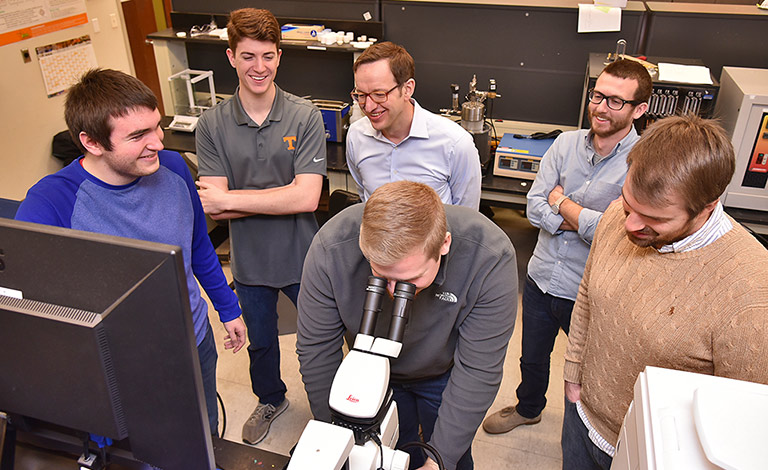Faculty Spotlight: Maik Lang

Maik Lang, assistant professor of nuclear engineering, came to the UT because of the unique opportunities to collaborate. The large concentration of researchers in nuclear materials, which include Brian Wirth, Governor’s Chair for Computational Nuclear Engineering; Steve Zinkle, Governor’s Chair for Nuclear Materials; William Weber, Governor’s Chair for Radiation Effects on Materials; Yanwen Zhang, associate professor in materials science and engineering; and Kurt Sickafus, Alvin and Sally Beaman Professor in materials science and engineering, was a major reason Lang chose to join the faculty.
“It is really great to have all these colleagues in such close proximity as it provides frequent opportunities to discuss research,” Lang commented. “Before I came here, networking was typically limited to irregular meetings at conferences and workshops.”
In addition to collaborating with researchers in nuclear engineering and materials science and engineering, Lang has worked with professors from other departments as well. Currently, he is working with Joshua Sangoro, assistant professor in chemical and biomolecular engineering, Haidong Zhou and Steven Johnston, assistant professors in physics, on a multidisciplinary research project.
“We received seed funding through the Office of Research to establish a research program which combines different disciplines in physics and materials research,” Lang said. “As assistant professors, we can feel the large momentum at UT to support young faculty members to be successful.”
Lang feels that working through problems together with his students is beneficial. “I also ensure that students are engaged by asking many questions in class so that they are able to develop difficult concepts with me, rather than me alone explaining it to them,” Lang said.
He also likes to use his research to provide real world examples when he teaches.
“The classes I teach often have a connection to my personal research, and when possible, I exhibit examples or include stories from my experiences to better illustrate the subject,” Lang said. “It is important to relate complex topics to real life application as it provides the students with a physical understanding instead of merely an equation as a means to an answer.”
Lang’s research focuses on the behavior of materials under extreme conditions. A major part of this research is to look at the structural damage of the materials in great detail. To accomplish this, his research group uses the Spallation Neutron Source at ORNL.
“We perform research at the Spallation Neutron Source on a regular basis and use neutron probes to investigate irradiated materials over very small length scales,” Lang said. “This has opened the door for us to a new research field focusing on disorder in materials and its impact on physical properties.”
Lang’s research group consists of a shared postdoc, three graduate students, and six undergraduate students. Lang feels it’s important to involve undergraduate students in research as it may spark an interest in science and an academic career.
The undergrads in his group help graduate students with their research, but are equal members and have their own projects as well.
“Our undergraduate students regularly participate at beam times at ORNL or Argonne National Laboratory, where they gain unique experience in research performed at larger user facilities,” said Lang. “Currently, three undergraduate students are preparing their first paper for submission to an international peer-reviewed journal.”
In 2015, Lang received the Ralph E. Powe Junior Faculty Achievement Award from Oak Ridge Associated Universities. The award afforded him a $5,000 grant from ORAU as well as a $5,000 grant from UT. Lang used the grant to fund a graduating master’s student’s research as well as fully support one of his undergraduate students, who will graduate this summer and continue with his group as a graduate student.
Lang enjoys running in his free time and the move to Tennessee from Michigan presented some positives and negatives for him. “Certainly, it’s much easier to maintain running over the winter months here in Tennessee as the climate doesn’t account for much snowfall or chilling temperatures, but the hills are definitely more challenging as compared to flat Michigan,” Lang commented.